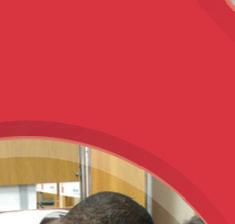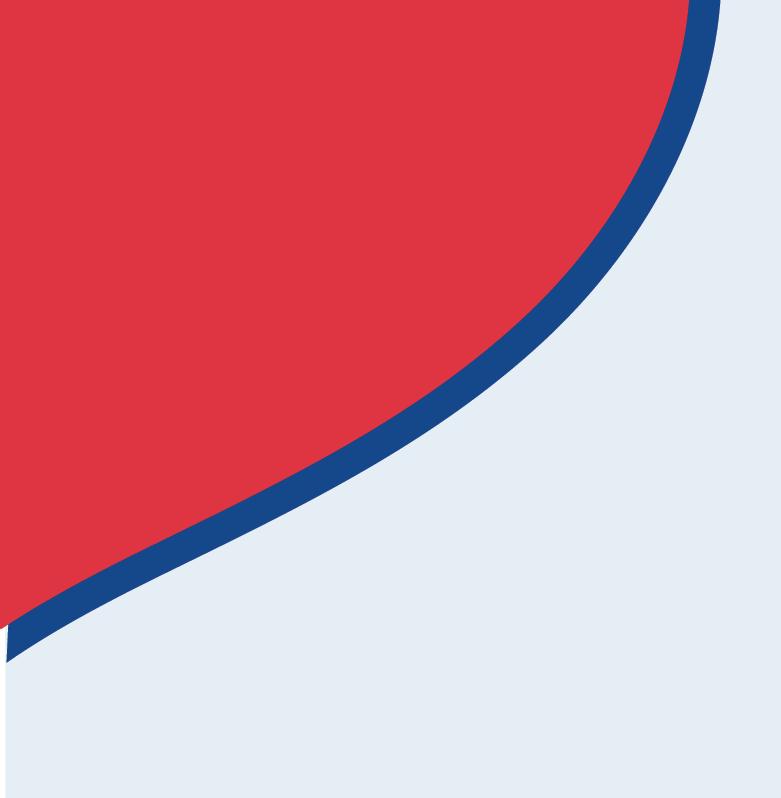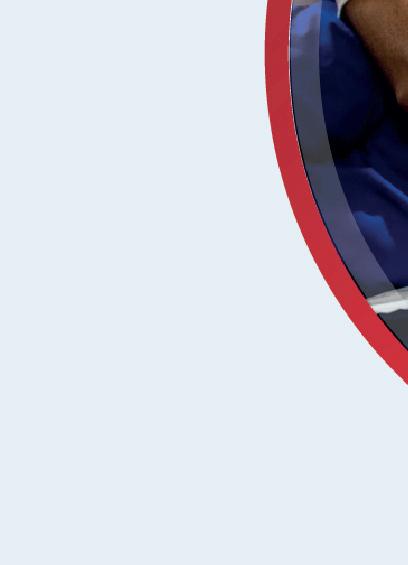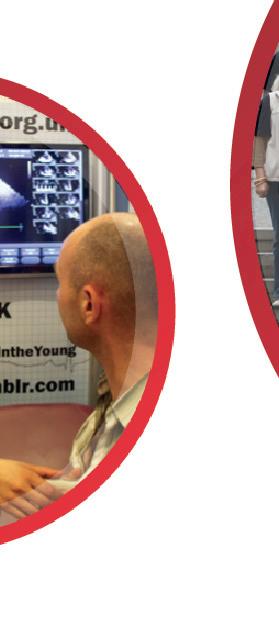
























Offering help and support to affected families HEART SCREENING for 14-35 year olds What you need to know @CRY_UK CardiacRiskintheYoung @CardiacRiskintheYoung www.c-r-y.org.uk
Who should read this booklet?
Who is this leaflet for?
• Anyone aged 14-35
• Anyone exhibiting symptoms as listed on page 5
• Anyone with a family history of heart conditions or young sudden death
• Parents
• Teachers
• School nurses
• Sports coaches
• Sports governing bodies
What is the aim of this leaflet?
This leaflet provides information about cardiac screening. It aims to help you make an informed choice about whether to have your heart tested.
What is the purpose of cardiac screening?
Sometimes an individual may have a cardiac abnormality without having any symptoms. Screening with an electrocardiogram (ECG) is aimed at identifying people with conditions such as heart muscle disorders or electrical faults of the heart.

Is cardiac screening important?
• The European Society of Cardiology (2010) and International Olympic Committee (2009) recommend cardiac screening with an ECG for any young person taking part in competitive sport.
• In countries such as Italy screening participants in representative sports is mandatory (Corrado et al., 1998).
• In some professions cardiac testing is mandatory. FIFA and UEFA regulations stipulate that from August 2008, every player in the first squad at a football club participating in international competitions must have a minimum of one ECG test and one echocardiogram (ECHO) test in their personal medical records. The Premier League also now undertakes biannual cardiac testing for all professional players.
• Although government statistics are not available, cardiac experts believe that at least 12 young people die each week in the UK from undiagnosed cardiac conditions (Papadakis et al ., 2009).
• Around 1 in 300 people have a potentially serious condition that will require lifestyle modification, treatment or surgery (Wilson et al., 2007)
Is screening just for athletes?
At CRY, we offer all young people aged 14-35 the opportunity to be screened. Cardiac incidents can take place at any time. They are not limited to high-intensity sport; they may occur just jogging across the park or when asleep at night. The screening programme is not just for people who play sport.

2 www.cry.org.uk
What happens on the day?
What happens at a CRY screening?
When registering, you will need to fill in a personal and family history medical questionnaire and sign a consent form. A screening administrator will measure your height and your weight.
will measure your height and your weight. The basic test is an electrocardiogram (ECG), which is a simple, non-invasive and painless test that examines the electrical activity within your heart. The ECG involves lying down quietly and it takes 5-10 minutes only. Small stickers are placed at strategic points on your chest, arms and legs. Flexible leads (called electrodes) that extend from the ECG machine are then attached to these stickers. The electrical rhythm of your heart is recorded and printed out. This part of the process only takes 2-3 minutes to perform.

After the ECG has taken place it is reviewed by a doctor who is an expert in these conditions. The doctor reviews each individual in conjunction with the personal and family history questionnaire.
About 5-10% of individuals will require an additional test following the ECG, which is an echocardiogram (ECHO). An ECHO is very similar to the ultrasound scan that is used for a pregnant woman to check the health of her baby. In cardiac screening, an ECHO will measure the dimensions of the heart and the flow of blood in and out of the heart.



Does it hurt?




Both the ECG and ECHO are painless, noninvasive procedures.


Do I need to prepare anything prior to my appointment?


You should rest for at least 30 minutes prior to your ECG appointment. You will need to complete a personal and family history medical questionnaire and consent form. Young people wishing to be tested who are under the age of 16 must seek written permission from a parent or guardian.
Do I need someone with me?
If you wish, a friend or chaperone can accompany you during the procedures. We strongly recommend that a parent or guardian is present when the person being tested is under 16.
Registered charity No. 1050845 3
What happens on the day?
Do I have to undress?
To conduct the tests, the physiologist will have to access your bare chest. If you are female you will be required to either remove or loosen your bra. Female physiologists will be used where possible.

Is there always a female present?
There is always at least one female ECG physiologist present.
When do I get my results and what do they mean?
You will either be notified of your result on the day by our doctor or by letter within 2-4 weeks if a doctoris not available on the day.
In the small percentage of cases where results appear abnormal, individuals will require follow up tests to further evaluate cardiac health. CRY aims to notify you (or your parents if you are under 16) and your GP within 4 weeks of the screening. In this case your GP will receive a letter including your results.



About 5-10% of individuals will require an ECHO on the day, but only 2-4% of individuals are usually referred for further tests.
What if there is an abnormality?
Approximately 2-4% of people have abnormalities that need to be followed up. The majority of these are not a problem. Around 1% of cases require ongoing monitoring; some conditions are not life-threatening but may require some minor lifestyle modification. Up to 1 in 300 people will have a potentially serious condition which will require ongoing lifestyle modification, treatment or surgery.

Additional tests such as a Holter monitor (a 24 or 48 hour ECG) or exercise stress test may be required. It is important to realise that a further review does not necessarily mean you have a cardiac condition, only that further information is required to give a full diagnostic evaluation.



4 www.cry.org.uk
on ECG and Medical Questionnaire ECHO No further tests required You will be referred for further tests No further tests are needed
What will happen?
What will happen if I am found to have a condition?
It would depend on the condition. Although many of the conditions are not ‘curable’ they are all treatable and treatments range from lifestyle adaptations to drug therapy or, in some cases, surgery.
How reliable is cardiac screening?


The majority of cardiac abnormalities that are most likely to affect young people will be identified. However, the ECG and ECHO tests cannot identify every possible cardiac condition.
If, having been screened by CRY where no abnormality was identified, you develop symptoms or a first-degree blood relative is diagnosed as having an inherited cardiac condition, you should contact your GP for further evaluation. If the GP does not view it as urgent, CRY offers a screening at the next available event.




What symptoms should I look out for?
Symptoms include:



• Chest pain during exertion
• Breathlessness
• Palpitations
• Dizziness
• Fainting
What happens to my results?


The information from the tests is strictly confidential and will not be disclosed to anyone other than yourself (or your guardian if you are younger than 16), your GP, and others who are directly involved with your care.
CRY’s screening programme is about identifying people at risk. However, it is also about building our understanding of these conditions. Every person we test will not only receive advice from a leading expert in these cardiac conditions but will also make a real contribution to our understanding of these conditions in the future. The information from these tests will be held on a database at CRY, assuming consent has been given, and may be used anonymously for research purposes.
CRY’s screening and research programmes are overseen by Professor Sharma, Professor of Inherited Cardiovascular Disease and Sports Cardiology at St George’s, University of London; Medical Director of the London Marathon; and Consultant Cardiologist for the London Olympics in 2012. In 2014 he commenced his duties as Chair of the European Association for Cardiovascular Prevention and Rehabilitation (EACPR) Sports Cardiology Section Nucleus, an elite committee tackling the complex issues of sports cardiology.
Registered charity No. 1050845 5
Will I need to be re-tested?
For the majority of individuals a single screening will suffice when there have been no symptoms and there is no family history of cardiac conditions.
Further screenings may be recommended:
1. by the relevant sporting federation for individuals who participate in high-level, competitive sports;

2. for individuals who develop new symptoms or whose family is affected by inherited cardiac disease;
3. for young individuals, going through adolescence, whose ECG is considered to represent a juvenile pattern (i.e. pre-puberty ECG).
Points to consider
Before deciding whether or not you want to take part in the CRY cardiac screening programme, you may like to consider some of the benefits and disadvantages, and think about what is important to you.

• Potentially serious heart conditions affect around 1 in 300 people. Our tests are able to detect the majority of cardiac abnormalities most likely to affect young people.
• In the event that a cardiac abnormality is diagnosed, you must be aware that this may affect certain mortgage applications, particular types of life insurance and it may also affect some careers.
• Cardiac screening is about identifying cardiac conditions and then providing lifestyle advice; monitoring; treatment and sometimes surgery to reduce the risk of a cardiac arrest.

• The European Society of Cardiology and International Olympic Committee guidelines
recommend having an ECG before participating in competitive sport.
• After initial screening the doctor may ask for further testing.
• A normal ECG reading does not predict cardiac health in the long-term and individuals who develop symptoms that cause concern should seek medical advice from their GP.
After reading this you may decide not to have your heart screened. At CRY we believe what is most important is that you obtain all the information you need to make an informed decision.
Booking a screening:
CRY holds both public and private screenings and will test individuals aged 14-35. CRY holds regular screening clinics in London and Northern Ireland.
There are also family memorial fund screenings in local communities, school screenings and services for elite athletes.
A doctor specialising in cardiac conditions that can affect young people will attend the screening event. The doctor will discuss the result with the person on the day, but will also confirm this in writing within 4 weeks.
Those people who require a follow up test (ECHO), due to having an abnormal ECG, will be able to have this test done on the same day.
Public screenings:
All appointments can be booked online. To see a list of dates and locations of upcoming screenings, visit www.testmyheart.org.uk or www.c-r-y.org.uk/screening
Information
6 www.cry.org.uk
and support
Information and support

Private screenings:
CRY will test up to 100 people a day. If you are interested in organising a private screening for your group, school, club, etc. please contact the CRY Screening Team via ecg@c-r-y.org.uk
Information and support:
For more information on CRY, or to watch a short film of CRY Patron Lawrence Okoye being tested, please visit www.c-r-y.org.uk

If you have any questions about screening, please visit www.testmyheart.org/q-a which features video responses to common questions from Professor Sanjay Sharma.





Who to contact:
If you have further questions, call CRY on 0203 691 0000


CRY would like to thank:










The James Tudor Foundation for funding this publication.


With advice and support from:
Professor Sanjay Sharma, Professor of Inherited Cardiovascular Disease and Sports Cardiology, St George’s Hospital, London. Further thanks for their valuable contributions to: Professor Michael Papadakis and Dr Navin Chandra
Thank you for the support of the affected families and the CRY myheart Network who have offered advice in the production of this booklet.
7 Registered charity No. 1050845
About CRY
Who are CRY?
Cardiac Risk in the Young (CRY) is a national charity that raises awareness of potentially lifethreatening cardiac abnormalities in young people and promotes screening.






Some of the sporting bodies that CRY carries out screening for include:



Premier League Football Clubs and Football League Clubs
Great Britain & Northern Ireland Olympic and Paralympic Athletes
England Rugby Football Union and all Premiership Rugby Football Union Clubs
Great Britain Rugby League and Super League Clubs
Lawn Tennis Association
England and County Cricket Clubs
CRY offers support to families who have experienced the tragic death of a young individual due to a cardiac condition.
CRY has a comprehensive resource network for affected individuals and family members that includes counselling and personal advice. CRY facilitates screening of all first-degree relatives of the deceased in highly specialised clinics in an attempt to prevent further potentially avoidable tragedies. CRY established the myheart Network to provide help, support and information to young people who are coping with the diagnosis of a heart condition.
CRY actively promotes research in the fields of inherited cardiac diseases, sudden cardiac death, screening and sports cardiology to advance our understanding of inherited cardiovascular conditions and reduce the incidence of young sudden cardiac death. CRY sponsors competitive research fellowship grants for outstanding individuals who wish to specialise in this field and has contributed to numerous national and international medical conferences as well as publishing over 100 articles, book chapters and academic papers in peer-reviewed medical journals. For further information visit www.c-r-y.org.uk/research
Further free copies of this leaflet are available from: Cardiac Risk in the Young Unit 1140B The Axis Centre Cleeve Road Leatherhead Surrey KT22 7RD They can also be downloaded from www.c-r-y.org.uk/screening
If you would like to help support CRY, visit www.c-r-y.org.uk to see how you can help.























































































